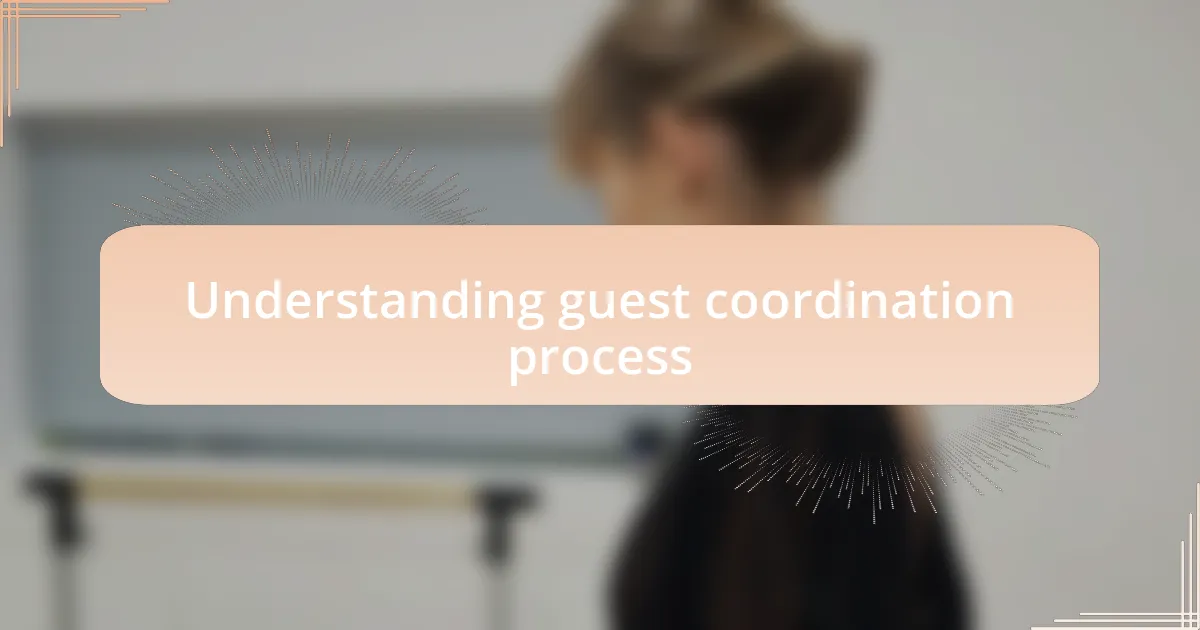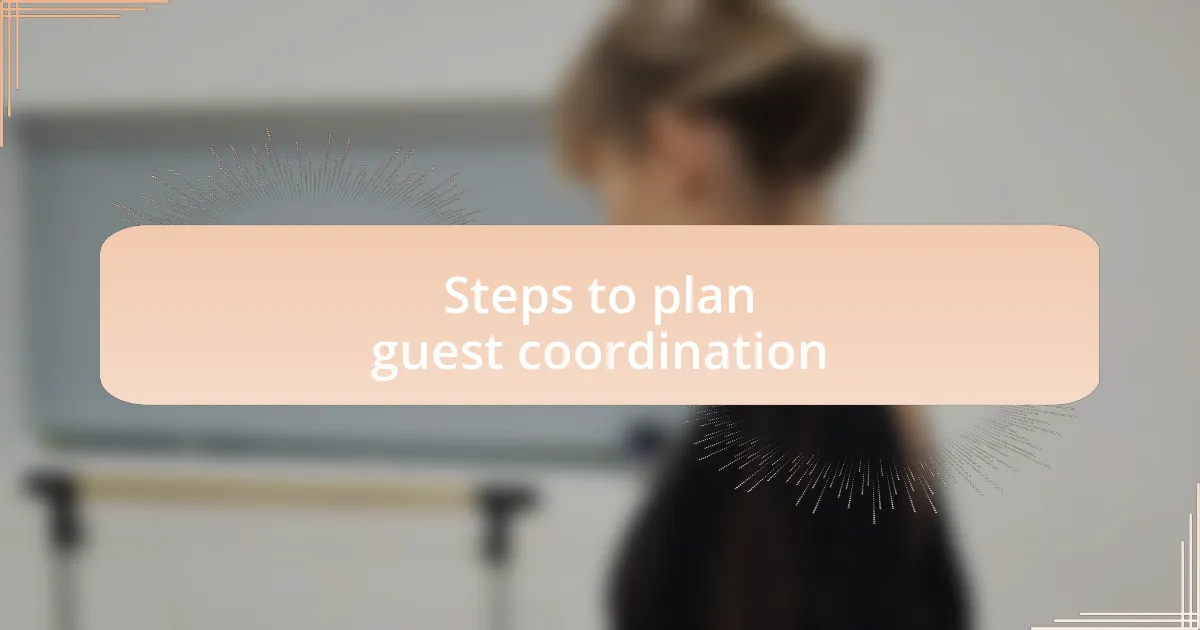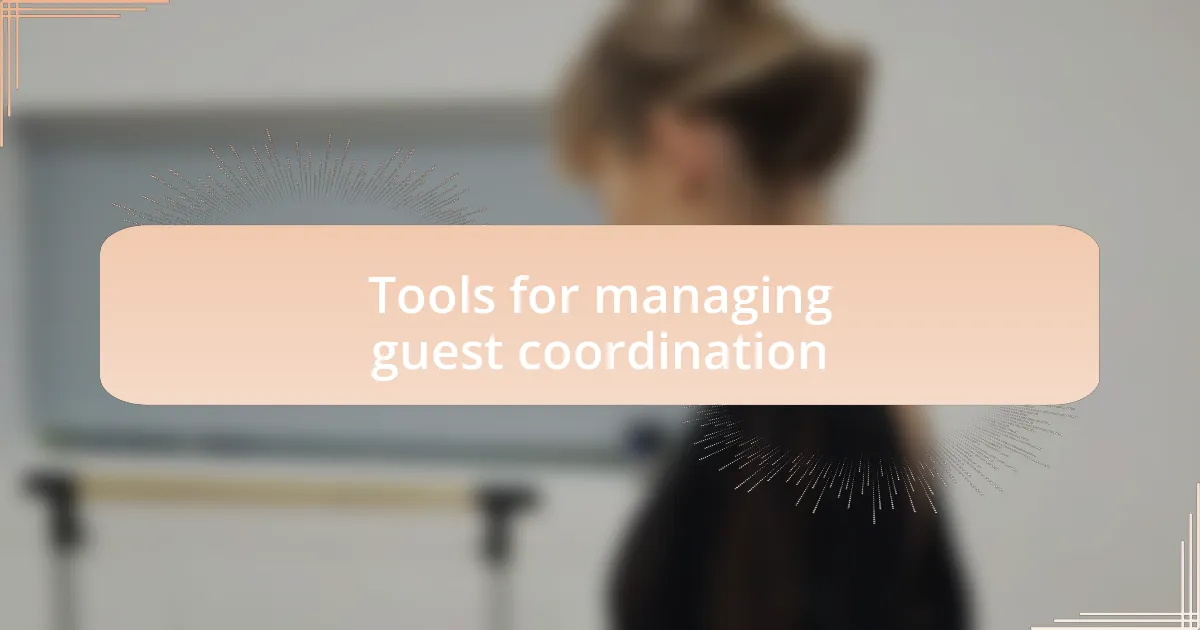Key takeaways:
- Clear communication is vital for successful guest coordination, as it helps prevent misunderstandings and stress.
- A detailed checklist keeps track of guest information and special requests, preventing last-minute chaos.
- Utilizing digital tools like Trello, WhatsApp, and Google Calendar enhances organization and facilitates smooth communication.

Understanding guest coordination process
When it comes to guest coordination, I always emphasize the importance of establishing clear communication. I remember one time I miscalculated the timing for a special guest’s arrival at a battle, and it created unnecessary stress for everyone involved. Could better communication have prevented that hiccup? Absolutely.
Understanding the nuances of your guests’ needs is equally crucial. There was a point when I hosted a workshop, and I discovered through casual conversation that one guest preferred a different type of music. Adjusting my playlist made a significant difference in their experience and ultimately contributed to a more vibrant atmosphere. This goes to show, small adjustments can lead to happier guests.
The coordination process is really about anticipating challenges before they arise. I once faced an unexpected venue change that threatened to derail an event. By quickly thinking on my feet and having backup plans in place, I was able to turn what could have been a chaotic situation into a smooth transition.

Steps to plan guest coordination
One of the first steps in planning guest coordination is to create a detailed checklist. I’ve learned that having a list helps keep everything organized and allows me to track guest information, special requests, and important deadlines. For instance, during one event, I forgot to confirm meal preferences for some VIPs. Imagine the chaos when they arrived and found their dietary needs unaddressed. A simple checklist could have prevented that!
After establishing your checklist, reach out to your guests well in advance. I once sent out information packets a month before a significant event. This not only gave them time to ask questions but also made them feel valued and genuinely welcomed. Isn’t it nice to feel like someone is thinking ahead for you? This proactive approach can set the tone for their experience.
Lastly, don’t overlook the importance of following up on your plans. I typically reach out a week before an event to confirm details and ensure everyone is on the same page. It’s amazing how this simple act can ease everyone’s nerves. I still remember a situation where a guest felt anxious about their travel schedule. A reassuring follow-up call made all the difference, allowing them to focus on enjoying the event rather than worrying about logistics.

Tools for managing guest coordination
When it comes to managing guest coordination, I’ve found that utilizing digital tools can make a world of difference. Apps like Trello or Asana help me keep track of tasks and deadlines visually. I remember one time, I used Trello for an event, and being able to drag and drop tasks gave me a clear picture of our progress. It felt satisfying to see everything moving forward.
Moreover, a group messaging platform like WhatsApp or Slack can streamline communication with guests. I once created a dedicated WhatsApp group for an event. This not only allowed for immediate updates but also fostered a sense of community among the guests. Have you ever been part of a group chat that buzzed with excitement? It enhances connection and keeps everyone informed.
Lastly, leveraging calendar tools like Google Calendar is essential for avoiding scheduling mishaps. I often share a live calendar with my guests so they can see the event timeline in real-time. This proactive sharing prevents confusion, especially when dealing with time zone differences. If only I had this tool during my early coordination days—imagine the headaches I could have avoided!